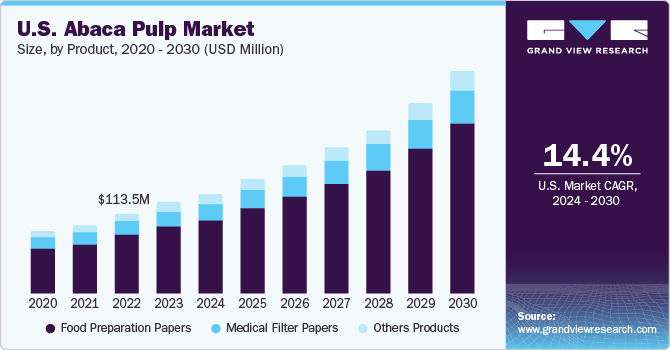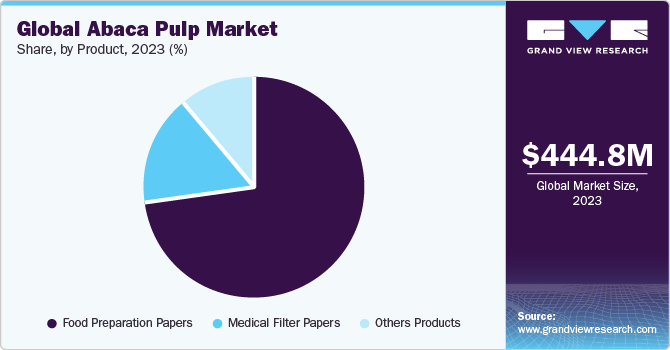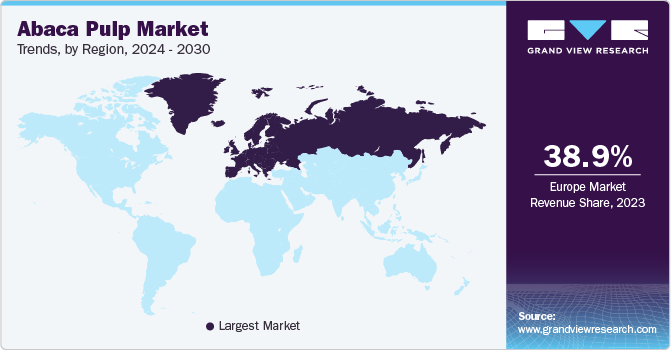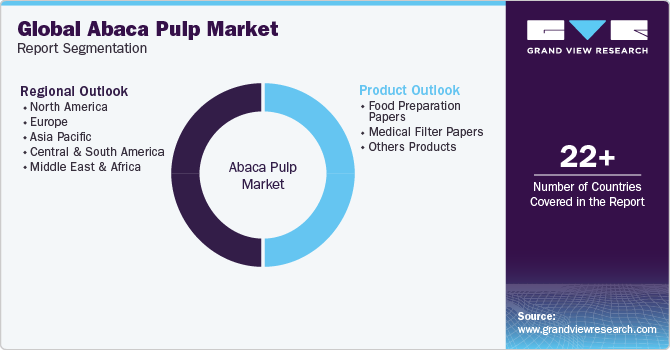- Home
- »
- Advanced Interior Materials
- »
-
Abaca Pulp Market Size, Share And Trends Report, 2030GVR Report cover
![Abaca Pulp Market Size, Share & Trends Report]()
Abaca Pulp Market Size, Share & Trends Analysis Report By Product (Medical Filter Papers, Food Preparation Papers), By Region (North America, Europe, Asia Pacific, Central & South America), And Segment Forecasts, 2024 - 2030
- Report ID: GVR-4-68040-164-9
- Number of Pages: 49
- Format: Electronic (PDF)
- Historical Range: 2018 - 2022
- Industry: Advanced Materials
Abaca Pulp Market Size & Trends
The global abaca pulp market size was estimated at USD 444.8 million in 2023 and is expected to grow a compound annual growth rate (CAGR) of 13.9% from 2024 to 2030. Abaca pulp is used to manufacture a range of papers, including food preparation papers, such as tea bags and filter papers. This is on account of the high-tensile strength and biodegradable nature of the abaca plant.

Global consumption of tea and coffee is growing on account of rapid urbanization, rising e-commerce retail sales, and the growing inclination of consumers toward ready-to-drink (RTD) coffee & tea, especially green coffee and green tea. Hence, as global consumption of such products increases, demand for abaca pulp is expected to grow over the coming years.
Market Dynamics
Several natural fibers, including abaca, coir, cotton lint, flax fiber, jute, kenaf, kapok, ramie, sisal, silk, and wool, have been widely used over the past few years in several application industries, such as food & beverages and medical. Abaca pulp is highly valued for its long and strong fibers, making it an excellent choice for specialty papers. It is often used in the production of tea bags, currency paper, and security documents due to its ability to withstand wear and tear. Increasing disposable income of younger population groups in developing economies, including China, India, and South Korea, is further promoting the consumption of tea and coffee. In addition, growing awareness among consumers regarding health risks associated with consumption of carbonated beverages is resulting in a shift toward RTD tea and coffee. These factors are expected to propel the demand for tea bags and coffee filters, which will boost demand for abaca pulp over the coming years.
Abaca pulp is used to manufacture a range of papers, including food preparation papers, such as tea bags and filter papers. This is on account of the high-tensile strength and biodegradable nature of this plant. Many companies involved in the production of RTD tea and tea bags are opting for sustainable materials as raw materials to reduce their carbon footprint and achieve sustainability goals. A few of these manufacturers include Clipper Teas and Pukka Herbs. Furthermore, there is a high burden of various chronic health diseases, such as cancer, heart disease, and diabetes, due to rapid socioeconomic development. Health benefits associated with the consumption of RTD tea are capturing the attention of consumers, particularly the geriatric population, which is increasing demand for these products. This is expected to further promote market growth.
Demand for abaca pulp in the U.S. is attributed to a growing demand for renewable and biodegradable products along with rising adoption of sustainable products in the country. Abaca pulp can be used as a substitute for wood pulp in various paper and textile applications. Hence, its growing adoption in the paper industry, and specialty applications including tea bags & coffee filters, owing to their high durability, will drive industry growth. The U.S. reported a substantial rise in product imports from the Philippines in 2020. This was attributed to a significant rise in adoption of these fibers in several application industries, leading to market growth. In addition, a rise in the adoption of sustainable fibers in the paper & specialty paper industry, to align with global sustainable development goals (SDGs), is expected to create new growth opportunities for the U.S. market.
Product Insights
Based on product, food preparation papers led the market with the highest revenue share of 72.8% in 2023 and is forecasted to grow at a CAGR of 14.5% from 2024 to 2030. Abaca pulp finds application in the production of tea bag filters, coffee bag filters, and other filter papers on account of its strength, durability, and elasticity. This material has toughness and superior liquid and air permeability which is essential for its application in food preparation papers as it helps in keeping the product fresh for a long. In addition, rising trend of using sustainable and economical materials is expected to increase product usage in food preparation papers. Rising popularity of RTD tea and coffee around the globe will also augment product demand. To produce tea bags and coffee bag filters, abaca pulp is an ideal material.
These papers are required to be robust enough to keep tea leaves and coffee grinds in place without tearing and going porous to let water through. Therefore, the long, fine fibers of abaca and their resilience to tearing make it a perfect material for this end-use. Furthermore, this pulp, when combined with other fibers, aids in the production of coffee filter papers. The use of this pulp in medical filter papers is also expected to grow over the forecast period. Distinctive product properties, such as its fine fibers, strength, and filtration capacities, make it an ideal material for manufacturing medical filter papers and face masks. These filter papers are essential for measuring accuracy and dependability during laboratory and medical procedures where superior filtration of matter or liquid is required.

The product is highly used in the production of filter papers for laboratory, pharmaceutical, environmental testing, and biotechnology sectors. The ability of abaca pulp-based medical filter papers to capture particles makes them suitable for chemicals, suspensions, and fluids in laboratories. In addition, it is produced and processed in a manner that fulfills all the quality standards required for a material to be used in medical filter paper manufacturing. This ensures uniformity and purity of medical processes. Furthermore, chemical compatibility of these filters is increasing product usage in the production of medical filter papers.
Regional Insights
Europe dominated the market with a major revenue share of 38.9% in 2023 and is forecasted to grow at the fastest CAGR of 14.1% from 2024 to 2030. The climate in European countries is mostly cold, due to which, consumption of RTD hot beverages, such as different types of coffees and teas, is high in this region. This has resulted in growing demand for tea bags and coffee filters in the regional market. Tea bags made from sustainable materials, such as abaca pulp, are in high demand due to growing awareness regarding climate change. In addition, European governments often implement policies and incentives to promote sustainable and eco-friendly practices in various industries.

These policies may encourage businesses to use abaca pulp or invest in R&D related to its applications. Many consumers are leaning toward environmentally friendly materials rather than conventional paper and plastic products. This trend is expected to grow more in the coming decade and thus drive the demand for abaca pulp & its products in Europe. Product demand in North America is driven by several factors including rising demand for sustainable eco-friendly materials and growing paper industry. The demand for specialty paper and paper products in North America is high for applications, such as tea bag paper, filter paper, and currency paper.
For the year 2022, Asia Pacific has been the largest manufacturer of abaca fibers in the world, with the Philippines accounting for more than 85% of the global market share. The market in Asia Pacific is expected to witness high growth over the projected period owing to rising product usage in applications, such as medical masks, tobacco paper, tea bags, coffee filters, and specialty paper. Product adoption in the currency production industry in Japan and the Philippines is expected to further drive region’s growth. In addition, favorable trade policies by Japan and India for product import are expected to benefit the regional market growth.
Key Companies & Market Share Insights
The market consists of a moderate number of large- and small-scale players. These companies follow strategies, such as product launches, expanding existing manufacturing capabilities, and improving geographical reach, to gain a competitive advantage over other players. For instance, in September 2023, Glatfelter Corporation announced a partnership with Ekman & Co. to sell its abaca pulp product via the latter’s sales agency. The company stated that the experience of Ekman & Co. in the field of pulp and logistics is expected to help them in catering to a larger market. Furthermore, growing awareness about the production of eco-friendly products and the importance of environmental sustainability force companies to opt for advanced products, which is an opportunity for product manufacturers.
Key Abaca Pulp Companies:
- Specialty Pulp Manufacturing, Inc.
- ALINDECO (Albay Agro-Industrial Development Corporation)
- Ahlstrom
- Terranova Papers
- University Products, Inc.
- Preservation Equipment Ltd.
- Pulp Specialties Philippines, Inc.
- Wigglesworth & Co. Limited
- Glatfelter Corporation
Abaca Pulp Market Report Scope
Report Attribute
Details
Market size value in 2024
USD 487.5 million
Revenue forecast in 2030
USD 1.0 billion
Growth rate
CAG of 13.9% from 2024 to 2030
Base year for estimation
2023
Historical data
2018 - 2022
Forecast period
2024 - 2030
Quantitative units
Volume in tons, revenue in USD million/billion, and CAGR from 2024 to 2030
Report coverage
Revenue forecast, volume forecast, company ranking, competitive landscape, growth factors, and trends
Segments covered
Application, region
Regional scope
North America; Europe; Asia Pacific; Middle East & Africa; Central & South America
Country scope
U.S.; Canada; Mexico; Germany; UK; Italy; France; China; India; Japan; Philippines
Key companies profiled
Specialty Pulp Manufacturing, Inc.; ALINDECO (Albay Agro-Industrial, Development Corp.); Ahlstrom; Terranova Papers; University Products, Inc.; Preservation Equipment Ltd; Pulp Specialties Philippines, Inc.; Wigglesworth & Co. Ltd.; Glatfelter Corp.
Customization scope
Free report customization (equivalent up to 8 analysts working days) with purchase. Addition or alteration to country, regional & segment scope.
Pricing and purchase options
Avail customized purchase options to meet your exact research needs. Explore purchase options
Global Abaca Pulp Market Report Segmentation
This report forecasts volume & revenue growth at global, regional, and country levels and provides an analysis of the latest trends in each of the sub-segments from 2018 to 2030. For this study, Grand View Research has segmented the abaca pulp market report based on product and region:

-
Product Outlook (Volume, Tons; Revenue, USD Million, 2018 - 2030)
-
Food Preparation Papers
-
Medical Filter Papers
-
Others Products
-
-
Regional Outlook (Volume, Tons; Revenue, USD Million, 2018 - 2030)
-
North America
-
The U.S
-
Canada
-
Mexico
-
-
Europe
-
Germany
-
UK
-
Italy
-
France
-
-
Asia Pacific
-
China
-
India
-
Japan
-
Philippines
-
-
Central & South America
-
Middle East & Africa
-
Frequently Asked Questions About This Report
b. The global abaca pulp market size was estimated at USD 444.8 million in 2023 and is expected to reach USD 487.5 million in 2024.
b. The global abaca pulp market is expected to grow at a compound annual growth rate of 13.9% from 2024 to 2030 to reach USD 1.0 billion by 2030.
b. The food preparation papers segment of the market accounted for the largest revenue share of 72.8% in 2023 owing to rising demand for sustainable packaging materials
b. Some of the key players operating in the abaca pulp market include Specialty Pulp Manufacturing, Inc., ALINDECO (Albay Agro-Industrial, Development Corporation), Ahlstrom, Terranova Papers, University Products, Inc. , Preservation Equipment Ltd , Pulp Specialties Philippines, Inc., Wigglesworth & Co. Limited, and Glatfelter Corporation
b. The key factors that are driving the abaca pulp market is the growing demand for growing adoption of natural fiber products
Share this report with your colleague or friend.
![gvr icn]()
NEED A CUSTOM REPORT?
We can customize every report - free of charge - including purchasing stand-alone sections or country-level reports, as well as offer affordable discounts for start-ups & universities. Contact us now
![Certified Icon]()
We are GDPR and CCPA compliant! Your transaction & personal information is safe and secure. For more details, please read our privacy policy.
We are committed towards customer satisfaction, and quality service.
"The quality of research they have done for us has been excellent."





